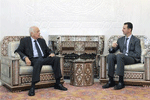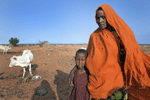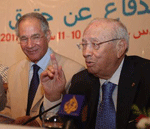|
Published on Fri, 2011-09-16 11:54
Sources: ECLAC, Representatives of the civil society Representatives of the governments of Latin America and the Caribbean who convened this week in Santiago de Chile didn’t include among their recommendations to the United Nations Conference on Sustainable Development (Rio2012), to be held next year in Brazil, the concept of “green economy”. |
Published on Thu, 2011-09-15 10:01
Source: International Federation of Human Rights More than 170 national, regional and international civil society organizations sent an open letter to Dr. Nabil El Araby, Secretary General of the League of Arab States, urging the bloc to put pressure on Syria’s government to effectively end the crackdown on peaceful opposition, release all political prisoners and provide compensation for victims. |
Published on Wed, 2011-09-14 09:05
Source: Afronline As hunger threatens 12 million people in the Horn of Africa, a study by the International Livestock Research Institute (ILRI) of the response to Kenya’s last devastating drought found that investments to increase the mobility of livestock herders – a way of life often viewed as “backward” despite being the most economical and productive use of that country’s drylands – could be the key to avert future food crises. |
Published on Tue, 2011-09-13 11:58
Sources: ETAN, La’o Hamutuk The government of Timor-Leste must "keep the nation debt-free and refrain from borrowing money from international lenders […] to protect its future generations," warned 137 civil society organizations based in 32 countries. Dili has not borrowed foreign funds since its independence in 2002. |
Published on Mon, 2011-09-12 08:31
Sources: Associated Press, TunisiaLive, Agence Tunis Afrique Presse, Leaders, in French The Tunisian League for Human Rights (LTDH, one of the focal points of Social Watch) held its annual congress for the first time in 11 years from Friday to Sunday. The group, barred from carrying out all activities under president Zine El Abidine Ben Ali’s regime, called on the country's next authorities for an independent justice system, respect for women's rights and the end of capital punishment. |
SUSCRIBE TO OUR NEWSLETTER






